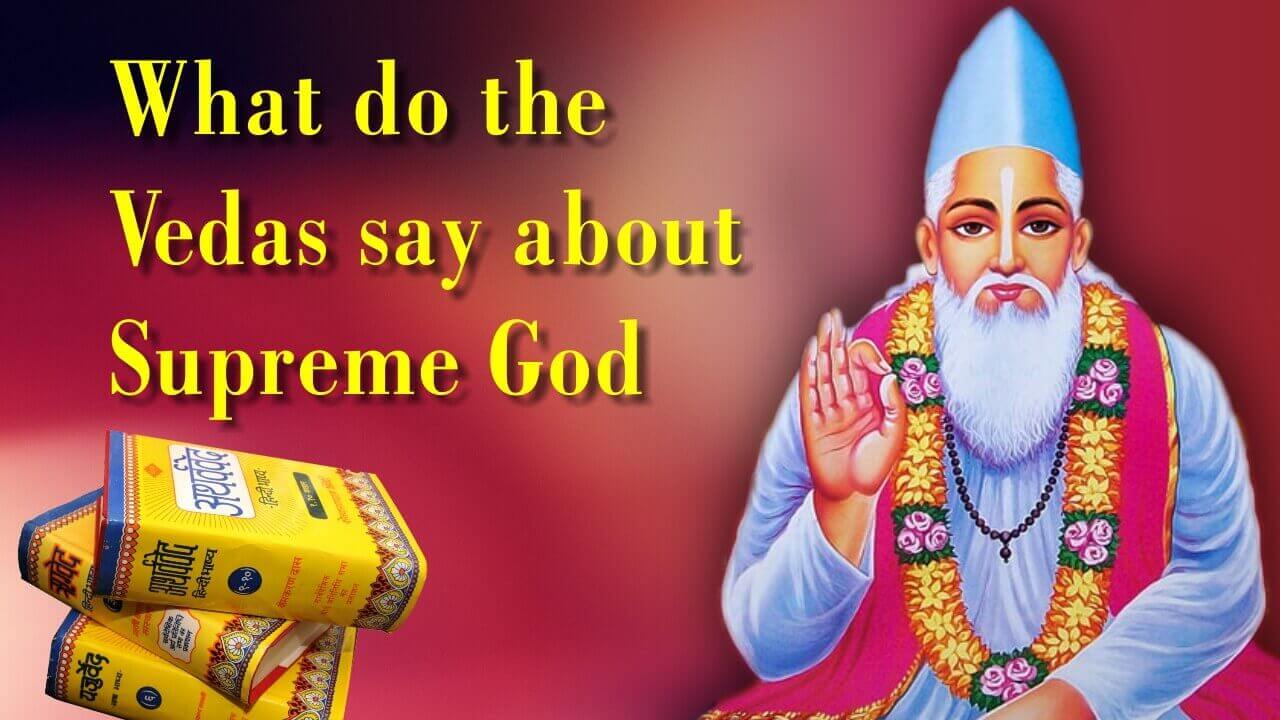Unknown Facts about Supreme God from the Vedas (Ved) - Scriptures pertaining to Hinduism, in fact the whole Humankind
There are four vedas namely Rig Ved, Atharva Ved, Yajur Ved and Sam Ved and they contain supreme knowledge about God. However little is known about the hidden gems mentioned in the vedas which have now been revealed by Saint Rampal Ji. A few of them are mentioned below.
1). God (named as Kavir Dev in the vedas) himself comes to spread his knowledge (Yajur Ved 29.25)
2). God appears on this earth and acquires the form of a child and then delivers his knowledge through his speech (poetry) as he grows up (Rig Ved Mandal 9, Sukt 96, Mantra 17)
3). When God appears as a child, He gets his nourishment from the milk of maiden cows, i.e. he drinks milk given by a maiden cow. (Rig Ved Mandal 9, Sukt 1 Mantra 9)
4). God attains the designation of a poet because he describes his supreme knowledge through poems, couplets etc. He himself is also seated on a throne under a dome in his eternal place. (Rig Ved Mandal 9, Sukt 96, Mantra 18)
5). God wanders on this earth and spreads his knowledge like a poet through his poems, couplets etc. (Rig Ved Mandal 9, Sukt 94, Mantra 1)
6). The name of Supreme God is Kavir (Atharva Ved, Kaand no. 4 Anuvaak no.1 Mantra no. 7)
7). God has a form. He is not formless (Yajurved Adhyay 5, Mantra 1)
8). God can forgive sins of his devotee (Yajurved Adhyay 8 Mantra 13). He is the giver of Supreme Peace (Yajur Ved Adhyay 5 Mantra 32)
FAQs about "What do the Vedas say about Supreme God"
Q.1 What attributes of forgiveness and peace are associated with the Supreme God in the Vedas?
The Vedas highlight that God has the power to forgive the sins of his devotees (Yajurved Adhyay 8 Mantra 13) and is the bestower of ultimate peace (Yajur Ved Adhyay 5 Mantra 32), emphasizing his compassionate and tranquil nature.
Q.2 How does the Vedas describe the manifestation of God on Earth?
According to Rig Ved Mandal 9, Sukt 96, Mantra 17, God appears on Earth in the form of a child and gradually imparts divine knowledge as he grows, using poetry and speech as mediums to convey his teachings.
Q. 3 Is there any mention in the Vedas about God receiving nourishment as a child?
Yes, Rig Ved Mandal 9, Sukt 1 Mantra 9 suggests that God, in his child form, receives nourishment from the milk of maiden cows, signifying a divine and unique sustenance during his earthly manifestation.
Q.4 What is the symbolic representation of God's designation as a poet in the Vedas?
The Vedas portray God as a poet, expressing his supreme knowledge through poetic compositions like poems and couplets.
Q.5 How does God disseminate his knowledge according to the Vedas?
The Vedas mention that God, in the form of a wandering poet, spreads his profound wisdom through various poetic forms like poems and couplets during his sojourn on Earth (Rig Ved Mandal 9, Sukt 94, Mantra 1).
Q.6 What is the specific name attributed to the Supreme God in the Vedas?
The Atharva Ved, Kaand no. 4 Anuvaak no.1 Mantra no. 7 refers to the Supreme God by the name "Kavir," signifying his divine presence and nature as described in the scriptures.
Q.7 Does the Vedas affirm that God has a definite form, contrary to being formless?
Yes, according to Yajurved Adhyay 5, Mantra 1, the Vedas assert that God possesses a form, suggesting that the Supreme God is not formless but has a divine manifestation.
Recent Comments
If you have any query regarding the above content, please email us at [email protected], we will try to solve it with proof.



Ramesh Arya
Until now, we have revered Kabir Saheb as a respected saint and poet. However, this article portrays Him as God, which is unacceptable as the Vedas do not mention the Almighty God as Kabir Saheb. The Vedas proclaim that Brahm is the only Supreme God.
Satlok Ashram
Dear reader, we value your engagement with our article. The wisdom of Shrimad Bhagwat Geeta Ji is imparted by Brahm (8:13), guiding Arjun to seek shelter in the Supreme God mentioned in Chapter 18, Verse 62. Hence, there is another entity mentioned in the Gita Ji as distinct from Brahm, who is the omnipotent God and creator of the entire universe and His name is Kabir. Also all four Vedas provide sufficient evidence that Kabir is God. For deeper spiritual insight, we recommend reading the book "Gyan Ganga" and listening to the spiritual discourses of Saint Rampal Ji Maharaj.